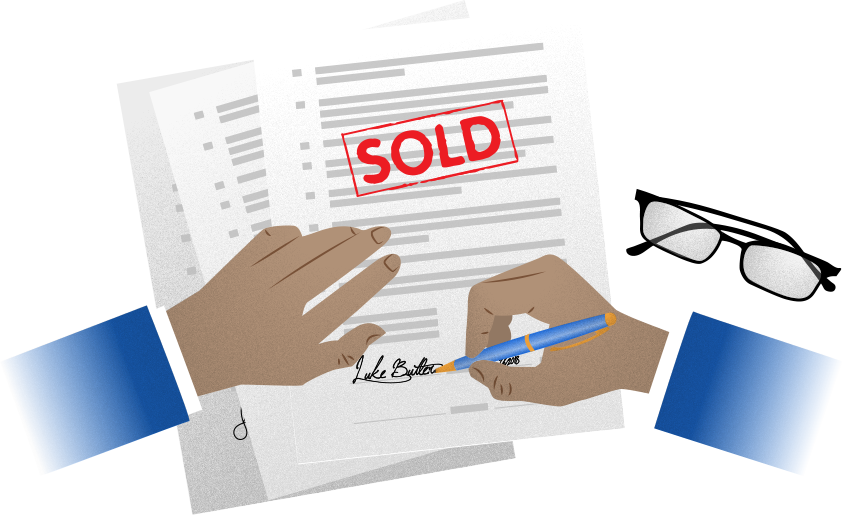
Home Seller Closing Costs in Texas
One of the most common questions we get from our home sellers at ListingSpark is “How do I determine what my closing costs are”? For this article, we are going to focus on the home seller closing costs we would typically see in Texas with a residential sale (commercial sales typically have a different set of fees). This could easily differ from state to state, but we find most markets in Texas tend to be similar.
There are several different types of home seller closing costs incurred when selling a home and oftentimes they all get lumped together as “closing costs”. In this article, I will parse them out. Let’s use a case study of a $450,000 home in a residential neighborhood with a Homeowner’s Association.
Title Company Fees
It is more than likely that if you are selling a residential home in Texas the buyer is going to ask you (home seller) to pay for the title insurance policy. In a strong market with bidding wars happening frequently, this can be negotiable and switch to a buyer’s expense, but in my opinion, it’s best to expect this to be a seller’s expense.
The title insurance premium is set by the Texas Department of Insurance and will be the exact same at any title company you choose. Where a title company will differ on price is in the fees they charge for various services. Here is a breakdown of all the fees and expenses a seller may incur from the title company
- Title Insurance Policy: On a $450,000 home, the title insurance premium will cost $2,677. This fee is set by the state, and is calculated as a percentage of the sales price on a sliding scale that incrementally changes as prices rise. For an in depth table outlining how this works, use this link to TDI’s website
- Escrow Fee: Think of the escrow fee as an administrative fee the title company charges to work on the file through closing. This fee is set by the title company and typically ranges from $350-$700 depending on the title company you choose. Buyer and Seller will each pay an escrow fee at closing.
- Document Preparation: When you close, there are several documents you sign such as the warranty deed. Those documents are put together by a third party attorney. The fee to draw these docs typically ranges from $100-$150.
- Tax Certificate: The title company is required to balance and prorate year to date taxes at the time of closing. In order to do this, they order a tax certificate meant to verify the correct amount of taxes to collect. The tax certificate can vary based on the company or county but typically ranges from $40-$70.
- Delivery/Courier Fees: When a closing happens, a lot of documents need to be collected and mailed. Some title companies will pass those fees on to the buyer and seller. These fees can range from $25-$150 depending on the cost of postage and how much a courier service may charge.
- Mobile Notary: If you are not in a place where you can come in to sign in person and it’s more convenient to have someone come to you, a mobile notary can be used. Typically this is a $100-$250 fee for each signing (i.e. the buyer and the seller sign separately) depending on the situation. (Read all the way to the bottom to learn more about Spark Title and their free mobile notary service)
Contractual Expenses
Aside from the fees charged by the title company which may not be specifically outlined in the contract, there are fees in the TREC 1-4 residential contract and related addenda that clearly states who pays different fees.
- Survey Deletion Endorsement: This is section 6A(8)(i or ii) of the contract. If checked that the contract will be amended to read “shortages in area” at the expense of the seller. The cost to you as the seller is 5% of the title insurance premium. For our example of a $450,000 house, that fee would be $133.85. To quickly describe this, think of this as adding an additional insurance rider on to the title insurance policy for errors made by the surveyor that could harm the buyer. For a more detailed explanation, click here. This is a negotiable item that can be paid for by the buyer, but it’s fairly common for the buyer to try to get the seller to pay for it.
- Survey: If you have a good and valid survey, you will be able to use that in the transaction and will not incur any expense here. But, if you are not able to find a survey or for some reason the survey cannot be used, expect to pay somewhere between $450-550 for a new survey. Large lots or acreage properties can be significantly more in some cases. Some reasons the survey may not be able to be used include, it’s too old or too much has changed on the footprint of the property since the survey was done. If a new survey is required, it is negotiable who pays for it. With that said, most buyers purchasing a home expect to have a survey provided to them if they are paying fair market value for the home.
- Residential Service Contract: Section 7H, also known as the home warranty. Though this is a negotiable item the seller does not have to pay for, it is common with a competitive offer for the buyer to ask the seller to cover the cost of a one year home warranty. This covers items that the property insurance may not cover like the HVAC, water heater, etc. This generally ranges in cost between $500-$600.
- Seller Paid Closing Costs: Section 12A(1)(b) of the contract. This by definition is the buyer asking for a lump sum of money from the seller to pay for their closing costs at the time of closing. These are the buyer’s expenses which would be above and beyond the seller’s existing closings costs stated here in this blog post. It is absolutely negotiable, and you as the seller have the right to refuse to compensate the buyer for any of the closing costs. Keep in mind, many buyers will offer a higher sales price if they are asking for a credit from you here. This in essence keeps cash in the home buyers pocket which may be a necessity for them to close. Often, they are willing to pay a higher price which only marginally affects their monthly payment to lower their required cash to close. Be careful though, because the home will still have to appraise for the sales price, not the agreed sales price minus these closing costs.
- Option Fee: When you executed the contract, the buyer paid you an option fee, probably somewhere between $100-$400 in order to have the right to terminate during their inspection process. When the buyer closes, they do get this back, so it will show up as a line item on the settlement statement. It’s yours to keep if they back out though.
- Commissions: If you are working with a listing broker, you should already have this hashed out and should be expecting it, but page nine spells out how much is going to the buyer’s agent (typically 3% in Texas). The settlement statement will have a line item for both the buyer’s agent commission and your listing agent’s commission (also typically 3%). This should be the largest expense you see on your settlement statement at closing. Keep in mind, if you use ListingSpark to sell your home, you won’t see a Listing Agent commission on your settlement statement, saving you nearly 3% or over $13,000 in this instance.
Homeowner’s Association Fees
For homes sold in an HOA, expect to have fees at closing. There are 3 primary fees assessed at the time of closing that the seller may end up paying for.
- HOA Documents: Though negotiable it is common for the buyer to ask for the seller to provide them with a current copy of all of the HOA documents which typically consist of the rules and regulations, restrictive covenants, bylaws, etc. We generally tell the seller to expect a cost of $200-$250 for these documents.
- Resale Certificate: Also negotiable, but not uncommon to see this as a seller’s expense. The resale certificate is provided to the title company to ensure that all expenses are balanced. Much like the documents, we typically recommend budgeting $200-$250 for the resale certificate (in extreme cases, we have seen this higher).
- In some instances, an HOA will force you to purchase a “resale package” which includes both the documents and the resale certificate as a bundle. This typically costs $400-$575 and you may not be able to parse them out and pay for them separately.
- Transfer Fee: You will notice in the HOA addendum, the section reads that the buyer agrees to pay up to _____ amount of the transfer fee and the seller will pay the difference. The transfer fee typically costs $150-$250 and usually the buyer agrees to pay for this expense.
Taxes
Though not technically a closing cost, prorated taxes will show up on your closing statement so we want you to be prepared for that. Oftentimes, home sellers in Texas are baffled to see such a large amount get collected for taxes at closing since they have been including a tax and insurance payment every month with their mortgage. This is called “escrowing” your taxes. Your lender estimates what your taxes will be for the year, divides that into 12 monthly payments and then collects that with your mortgage payment every month.
Even though you have technically paid your taxes every month, the tax bill itself has not been paid to the county when you close on the home. The money has been collected by your lender and placed into an escrow account so the funds are there to pay the tax bill when it comes due. Your lender does not release your escrow account to the title company prior to closing so that money is not for the sale. Since the buyer (or their lender if they will escrow their taxes) ends up paying the tax bill at the end of the year, the title company is required to give the buyer a year to date prorated credit to cover the time that year that you owned the property. Don’t worry though, you will get this money back after you close. Your lender will send you a check for the balance of your escrow account after you close (you typically receive this within 1-2 weeks after closing but some lenders can take as much as 30-60 days) and typically there is a surplus in this account so the amount you get back is more than the amount collected by the title company at closing.
Let’s do the Math
So to quickly recap, home seller closing costs for a $450,000 residential home within an HOA in Texas, you can expect the following expenses when you sell (keep in mind, these are averages and could change, it’s never a bad idea to have the title company provide you with a net sheet or mock HUD for your own sale):
- Title Insurance Policy: $2,677
- Survey Deletion Endorsement: $133.85
- New Survey: $500
- Escrow Fee $550 on average (Keep reading below to learn about Spark Title’s low fees)
- Document Prep: $125
- Tax Certificate: $50
- Mail/Courier Fees: $100
- Mobile Notary: $150
- Home Warranty: $550
- Buyer’s Agent Commission: $13,500
- Listing Agent Commission: $13,500 (Remember to look in to ListingSpark to virtually eliminate this huge line item on your settlement statement)
- HOA Docs: $200
- Transfer Fee: $100
- Resale Certificate: $200
Grand Total Closing Expenses: $32,336
As you can see, it can be very expensive to sell a home in Texas. If you are looking for a way to save on some of these expenses, please look into using ListingSpark and their sister company Spark Title to help you sell.
If using ListingSpark & Spark Title together you can save $13,450 on the expenses through commission savings and reductions in title fees.
At Spark Title, it is a very clean settlement statement at closing. They cover many of the fees other title companies charge the seller. Lower escrow fees, no courier fees or mail fees add up, and the mobile notary service is always complimentary. These fees alone can save over $500 to the seller. In many cases, the savings you receive from Spark Title could cover the entire listing cost at ListingSpark
Related Posts
How to Unlock Potential with Real Estate Software for Investors
In the fiercely competitive world of real estate investment, picking the right tools can be the difference between profit and losing money on a property. As digital innovation continues to reshape the landscape, a new…
Modern House Flipping Software: 8 Innovative Tools You Need
House flipping isn’t just an opportunity for big real estate companies or home improvement television channels—it’s becoming a reliable source of income for Americans running a solo business or small real estate investment venture. While…
Smart Savings: The Advantages of Flat-Fee Listing on the MLS
Selling a house traditionally has always been an arduous process, and right now, it’s even more turbulent. With the current NAR settlement shaking up commission processes and costs for buyers and sellers, investors have even…




